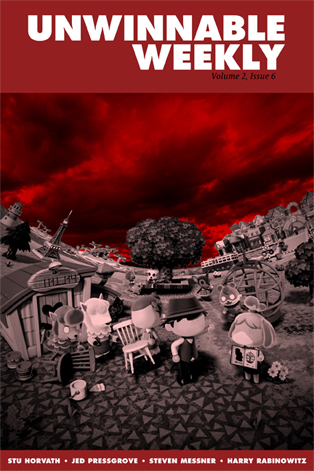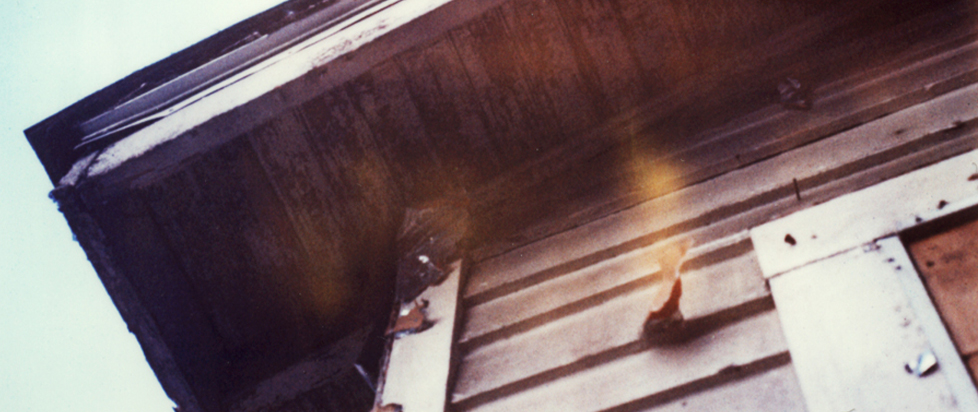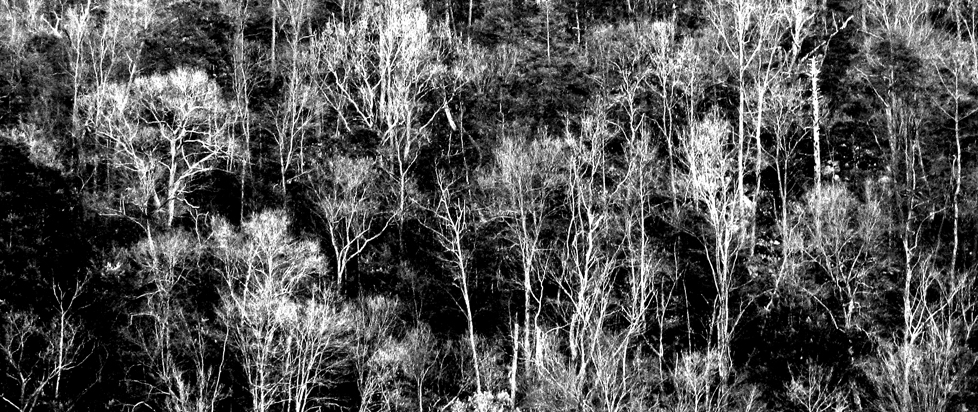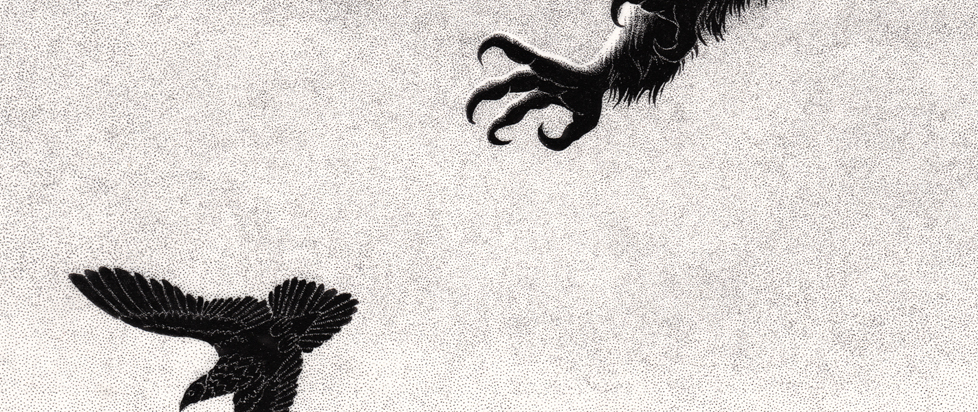
Senses All Turned Up: An Interview with Stephen Graham Jones
The following is a reprint from Unwinnable Weekly Issue Fifty-Eight. If you enjoy what you read, please consider purchasing the issue or subscribing.
———
Stephen Graham Jones is a storyteller.
I mean that in a literal sense. His writing has a distinctly vocal quality in its cadences. Pick up anything he’s written and, in no time, you’ll feel like Jones is sitting across from you, speaking the words off the page.
Mostly, I feel like we’re sitting in a bar, dimly lit, a little seedy. Whatever Jones is at the moment – a tattooist, a kid, a werewolf, a workaday husband – he’s sitting a few chairs down. You don’t know him, maybe have just seen him around, but now he is talking to you. His story infects the air with tension. You breathe it in, can’t escape it, can’t stop listening. There’s no way to get loose of this ancient mariner’s grip.
You don’t want to know what happens next. This is a horror story, of course. It’s not going to be anything good.
When I think about the interview I conducted with him, this is what I remember. The two of us, in some dive bar where no one ever makes eye contact, talking over the same three Elvis tunes that are stuck on repeat in the old jukebox. Which is funny, because we did the interview over email. I’ve never even heard his voice. That’s some of the Jones magic, right there.
The Jones I spoke to is a hunter. He’s speaking now, though. Better listen.
“I live in Colorado now,” he says, “and everybody’s always going hiking and camping. I’m having such a hard time mentally plugging into this idea. For me, yeah, you hike, yeah, you camp, but that’s never the end, the goal, that’s just the necessary means to do whatever it is you’re really wanting to do. I want to get back where the big mule deer are, say, but there’s no roads, so I can’t sleep in my truck. This means I’m going to have to hoof it a few miles into the trees and bring a sleeping bag with me.
“But hiking and camping, it’s weird to me that they’re a pleasure or recreation in and of themselves. They’re just what you do when you’re doing other things. People tell me it’s neat to look at stuff, I guess. Vistas, ‘nature scenes,’ I don’t know. And it definitely is. The world’s a pretty place. I see that prettiness all the time while staking out a pond or a meadow. And my senses are turned up, such that I really soak all this in.
 “But what I’m really waiting for, what I’m really trying to tune into, it’s some unsuspecting bull elk, about to nose into that meadow. That’s when the scene comes alive for me. Now it’s whether he smells you first, or he walks into range first. Then you’re part of the scene, not just looking at some postcard of it.”
“But what I’m really waiting for, what I’m really trying to tune into, it’s some unsuspecting bull elk, about to nose into that meadow. That’s when the scene comes alive for me. Now it’s whether he smells you first, or he walks into range first. Then you’re part of the scene, not just looking at some postcard of it.”
Jones’ story “Brushdogs” hums with that expectation. A father and son hunting in the snowy wilds of Glacier Park. There is something in the woods, but what it is doesn’t matter. What matters is the waiting, the watching, the lead up to when nature retracts to reveal something hidden and wrong. “Junior took a step higher, his back straightening, some alarm ringing in his eyes.”
Junior, like many of Jones’ characters, is a practical man. He parses the horror of his situation through years of his own experiences, as well as the lessons of his father. Surely his own son is just lost, has forgotten how to flush elk the way he has been taught. Surely there’s a reasonable explanation for him to be on all fours near that cairn of black rocks.
This deliberateness is a trait many of Jones’ characters seem share with their author. They are largely down to earth, average Joes – some poor, some rural, some shady, some just plain old regular. There aren’t too many antiquarians or scientists here, or even cops or detectives.
“Growing up, we never had money, so we were always looking up the hill – figurative hill, as this was West Texas, and it’s flatter than flat – to the people with the money,” he says. “It’s probably a form of envy, really, but we’d always talk bad about them, we’d always say that we were better off not having money.
“Now, though, I mean, maybe I’m up on that hill myself, yeah? Could be. I still see things from being sixteen, in town with my scrapped-together truck I’d painted in my friend’s garage, since we didn’t have a garage, and then other kids rolling into the parking lot in twenty-five thousand dollar built cars, cars I’d spent all week drooling over in the magazines.
“My characters do kind of prize or champion that it’s what inside that counts, I hope. Not what you’re driving. However, in everything I write, I do tend to have either a bad car or a bad truck. I’m still and forever looking up that hill, I suppose. Those kids rolling into the ten o’clock parking lot in their bad Camaro, sure, we hated them, and they knew it, so they kept themselves over there. But I still want to be the one pulling in in that car, too.”
Jones’ early years in West Texas, ranching and farming, bleed into everything he writes. His semi-autobiographical novel Growing Up Dead In Texas is as much a catalogue of the old trucks of his youth as it is a mystery about small town secrets. No one can lovingly describe dents and crummy paint jobs like Jones.
He didn’t finish high school “the normal way,” but his mother paid for a semester of college anyway. A first year philosophy course hooked him into academia for life, eventually leading him to the faculty of University of Colorado Boulder, where he teaches creative writing and literature. It keeps him sharp. “I hear myself articulating this technique or that principal or this rule of the thumb or that suspicion, and then,” he says, “when I’m writing, it comes back, and I think I’d better test that, see if I was lying or not. ”
Reading Where the Red Fern Grows in the fourth grade started Jones on writing. “That was when I knew I could write,” he says, “that I could hang a lantern on an old rusty axe-head like that. Just, I always figured I’d be doing it deep in the night in my trailer after a day of driving tractor. Never dreamed I’d get to write in the daylight hours.”
Jones makes good use of those daylight hours, writing like the devil. The pace of his output is astonishing: 15 novel and over 200 stories since his first book, The Fast Red Road, hit shelves in 2000. It is a wonder he doesn’t repeat himself.
“ I always repeat myself,” he says, “and I’m always surprised that nobody calls me on it. I think most writers, we just have one, maybe two stories, total. Just, they’re vital enough to us that we keep telling those two stories over and over.”
The same way campfire stories and big fish stories and bar stories are the same but always changing.
“As for process, man – every time out’s different, so far,” he says. “Sometimes I start with a line, sometimes I spend a couple of weeks outlining. Sometimes the novel comes out fully-formed the first time, sometimes there’s a year or two of drafts.
“You hunt different animals different ways, I figure, and every novel, it’s a completely different animal.”
And here we are, back to hunting. Just in time to start talking about horror again.
Jones’ first brush with horror was indirect. His aunt and uncle, after seeing Halloween, couldn’t bear to sleep in their own trailer, so they slept on the floor of his grandmother’s with him alongside. Next was seeing The Eyes of Laura Mars on HBO, when Jones was in first grade. Then came re-enactments of movies like Terminator by a friend who’d gone into town for the movies.
“Thirteen, that was the watershed year of horror, for me,” he says, “living down outside Austin, my friend David had a couch and a VCR in his garage. On Friday nights, we’d get a group of us and grab armfuls of slashers from the video store and play them as loud as his little TV could. Come two or three in the morning, his dad would get drunk enough to sneak around outside in his Freddy glove and scrape those blades on the metal door of the garage, at which point we’d scream and run – not because we thought he was Freddy but because we thought he might be going to kill us – and that running through the trees in the pitch-black, smiling and crying and fighting to break through, to get away…from then on, I was hooked.
“I always feel like movies kind of stole my brain. I mean, we all spin a personal narrative in order to keep our identities persisting, of course, but, growing up when I did – but would every generation say this? – I feel like I was conditioned to remember my own life events as movie scenes, if that makes any sense. So, my narrative, instead of page-turns in it, there’s jump cuts, there’s fades, there’s a soundtrack. I’d be dishonest were I to tamp that down in my fiction, I think. I don’t even know if I could.”
Jones’ novel Demon Theory is a monument to horror movies. Perhaps novel is the wrong word, though. Divided into three parts, it purports to be a novelization of a trilogy of horror films. Using many conventions of screenwriting throughout – the result is not unlike having a friend describe a movie to you in excruciating detail, or Jones’ friend’s reenactment of Terminator. In the back of the novel, voluminous footnotes detail every film reference, horror and otherwise, in virtuoso fashion (I’d be hard pressed to think of a horror flick that doesn’t get a mention). Is Demon Theory a screenplay? A contextual pop culture history? Something else? Who knows.
It works as a kind of fugue as well, taking the horror archetypes from the first part of the novel and reshuffling and recontextualizing them for the subsequent parts. Characters find themselves in different roles, dead characters live again. In riffing on horror, it becomes a kind of macrocosm of horror that seeks to place the genre in a greater cultural context.
“Horror never goes away – people need the teeth, the blood, the jump scares – but it does wax and wane, sure,” Jones says. “We look back to the eighties and early nineties when King and Straub and McCammon and Barker and Strieber and the rest were filling the shelves with necessary gore, and we say it was because there was a horror boom. Which is maybe right. But, too, maybe it was just that a group of powerhouse writers were all kind of coming of age at the same time, and the market was hungry for what they had.
“The trick, of course, it’s not just being scary on the page, it’s being scary in a way that plugs into the psyche of the audience at that moment. So, no, it hasn’t happened like that for twenty-plus years. But this is a new year coming. And there’ll be a new year after that. That’s what you’ve always got to be thinking.”
While Demon Theory strains at the seams with horrors, it is “Growing Up Dead in Texas,” a novel completely devoid of monsters – at least the sort that wear an inhuman shape – that fascinates me the most.
Here, the storyteller is Stephen Graham Jones himself, hesitant to recall the details of the mysterious circumstances surrounding a 1985 cotton field, one he grew up by as a kid in West Texas. “I probably shouldn’t be doing this – I’ve never written non-fiction,” he writes in the preface. “Fiction. I wish I were writing fiction this time. It’s so much easier. This, though, it’s the only way I can go back, I think. If I even should.”
The story seems like it should be a straight forward untangling of all the secret knots tied by the residents of a small Texas town. Presented as a memoir, Jones’ first person narration should lend authority to the tale. In reality, he destabilizes it.
He frets over telling the story at all, a hesitation that manifests in the structure of the story itself as it flows into endless estuaries of Rashomon-like vignettes and personal digressions. Jones, the character, doesn’t want to tell the story, so Jones the writer busies himself turning firm ground into mud.
You’re sunk chest deep early on. In Chapter Three, Jones’ old English teacher becomes aware of the story while they talk and smoke cigarettes in the school parking lot.
“I’m a character,” she finally says, looking over at me.
In one of my books.
I shrug.
“You’re not going to use my real name?”
“I’m changing them all.”
“And Tommy?”
“He’s somebody else too.”
She nods, says, “That’s about true, yeah,”
“Ms. Godfrey—“
“What did Pete say?”
I start to tell her, know I’m going to get it wrong and scrape something open between them, so I pull my truck around, the sole of my boot skating over the asphalt, gravel dancing up against my rocker panel.
She reads the Pete part on my laptop, me blocking the sun, her blowing the dust from the screen, my hair in my eyes, but maybe that’s best.
“You used his real name.”
“Not both of them.”
From the first pages, you get the sneaking suspicion that this is a novel existing firmly in the realm of fiction. Which, perversely, makes it seem all the more real. By the time Ms. Godfrey reads the chapter you just read, you have no idea what to think. You’re torn between wanting it to be real and fearing you’re just a rube if you let yourself believe that, the way you felt when you let yourself believe, just for a minute, that the Necronomicon was a real book.
“I’d just finished Bret Easton Ellis’s Lunar Park when I wrote Growing Up Dead in Texas, and was really impressed by how he blurred those lines you’re talking about,” he says. “So I figured I’d give it a run myself, see how a project like this kicked.
“Every page I turn to in that novel, there’s a piece of me, there’s a scene that’s more fancied-up reportage than anything I dreamed into place. But I lose the dividing line pretty quickly too. Not just with this novel, but with everything I write. For me, I believe in the dreamspace the novel’s happening in so completely that this real world gets thin, and what I’m investing in, it’s on the page. It’s why I write fast – because I prefer to live in this world. Makes going to the grocery store a whole lot easier.”
Those lines are everywhere in Growing Up Dead in Texas, like when Jones mentions the Grateful Dead posters owned by his uncle that figure so prominently in the horror story “Till the Morning Comes.” Or with the deals Jones and other characters make.
They don’t make them with other people, or with God. They sort of make them with themselves, creating a little talisman of good luck in exchange for a little suffering. Jones, the character, recalls coming across a shack in a pasture that contained evidence of a squatter – beer bottles and beer cans and what looks like a floor plan of a jail cell.
I left as quietly as I’d come in, kept following the fence, finally and unaccountably finding a bottle of Mennen aftershave on its side by the base of a locust post. Like it had fallen from the sky. For me.
I knew what it was, what aftershave was, but I had to trade for what I’d seen in that shack, too.
I twisted the lid off, closed my eyes, and drank it all down at once, didn’t let myself throw it back up.
The way I know it worked is that whoever was staying there, or had been staying there, they never came for me, or my family.
“Back when I was, I don’t know, eight, ten, twelve,” explains Jones, “I used to always get in trouble for cutting myself. But it was always deals, like you’re saying.
“I’ll trade a cut here, or a cut shaped like this, for that. Made everything better. I stopped doing it at about – I think it was nineteen? That’s the last time I remember it happening. Big cut on my shoulder and chest, to pay for something.
“No more, though. I mean, sure, lots of cuts and stitches since then, but all just because I’m always playing with sharp things. Not because I’m trading anymore.”
“[As for the writing,] it’s just the same trick I’ve been doing since The Fast Red Road. Like everybody, I’ve got feelings and emotions all tangled up with this or that scene I lived through or half-remember. So I dress a scene or situation or character or event up in a way – and this often takes about fifty tries – that I think gets that feeling or emotion across. Like, the feeling, it’s all bundled up in the scene, but when the reader unpacks it, they feel it too. Or some version. That’s always the goal.”
It’s about closing time in our hypothetically bar.
The last thing I ask about is whether all these stories about hunting and the woods are tapping into some deep anxiety about the great outdoors and human frailty or something. It’s not a great question and I already know that it isn’t the case. Like Jones said earlier, he’s been telling the same story – horror, mystery, memoir – over and over. Theme and variation. Different tools to hunt different animals.
I wonder how things like this interview figure in to this one, long story, this fictional autobiography. What kind of hunt is this? What kind of weapons?
“I grew up out in the pastures and up in the trees, just shooting everything I could, and having all kinds of scrapes with snakes and livestock and game and on and on,” he says. “My friends from growing up, they’re all hunters too. It’s just, that’s the way it was. You always had a gun and a knife, were always going out to prove yourself against nature.
“Not saying that’s for sure the right way to think, but that’s for sure the way we did think.
“And I still go up for elk, of course, but it’s not to prove myself. Elk, they taste pretty good. And you don’t always get one, either.”
I can’t decide whether he’s talking about hunting or writing.
———
Author’s Note
Since Jones’ body of work is so large, I limited myself to drawing from two collections of short stories, Ones That Got Away and After the People Lights Have Gone Off, and two novels, Demon Theory and Growing Up Dead in Texas. All are available in digital formats and, while Demon Theory is out of print, it is also easy enough to find used in genre book shops.
Jones’ recent stories “Daniel’s Theory of Dolls,” “The Darkest Part” and “Universal Horror” appear in The Doll Collection, Nightmare Carnival and October Dreams II respectively. His stories can also often be found in the annual year-end best of anthologies.
He is currently at work on Mongrels, a new novel about werewolves. An alternate form of the very excellent “Doc’s Story,” available in After the People Lights Have Gone Off, serves as the novel’s first chapter.
* * *
This is the third installment in an occasional series that examines the creators behind the new strain of literary horror. This was spurred on by my recent discovery of this rich new vein of writing and my dismay that no one I talk to seems to know much about it. Every book store I visit, I check for work by the likes of Simon Strantzas, Livia Llewellyn, Nathan Ballingrud, Kaaron Warren and more. Every time, I leave disappointed.
This is my small attempt at spreading the word.
The first interview was with Laird Barron, in Unwinnable Weekly Issue One.
The second interview was with John Langan, in Unwinnable Weekly Issue Forty-Three.
At Stephen Graham Jones’ suggestion, Paul Tremblay (A Head Full of Ghosts, In the Meantime) will be the next victim…
———
Stu Horvath is the editor in chief of Unwinnable. He reads a lot, drinks whiskey and spends his free time calling up demons. Sometimes, he plays with toys and calls it “photography.” Follow him on Twitter @StuHorvath.




